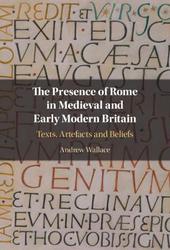
|
The Presence of Rome in Medieval and Early Modern Britain: Texts, Artefacts and Beliefs
Hardback
Main Details
| Title |
The Presence of Rome in Medieval and Early Modern Britain: Texts, Artefacts and Beliefs
|
| Authors and Contributors |
By (author) Andrew Wallace
|
| Physical Properties |
| Format:Hardback | | Pages:350 | | Dimensions(mm): Height 235,Width 160 |
|
| Category/Genre | Literary studies - classical, early and medieval
Literary studies - c 1500 to c 1800 |
|---|
| ISBN/Barcode |
9781108496100
|
| Classifications | Dewey:820.935845632 |
|---|
| Audience | | Professional & Vocational | | Postgraduate, Research & Scholarly | |
|---|
| Illustrations |
Worked examples or Exercises; 5 Halftones, black and white
|
|
Publishing Details |
| Publisher |
Cambridge University Press
|
| Imprint |
Cambridge University Press
|
| Publication Date |
17 September 2020 |
| Publication Country |
United Kingdom
|
Description
This book explores the cultural and intellectual stakes of medieval and renaissance Britain's sense of itself as living in the shadow of Rome: a city whose name could designate the ancient, fallen, quintessentially human power that had conquered and colonized Britain, and also the alternately sanctified and demonized Roman Church. Wallace takes medieval texts in a range of languages (including Latin, medieval Welsh, Old English and Old French) and places them in conversation with early modern English and humanistic Latin texts (including works by Gildas, Bede, Chaucer, Shakespeare, Bacon, St. Augustine, Dante, Erasmus, Luther and Montaigne). 'The Ordinary', 'The Self', 'The Word', and 'The Dead' are taken as compass points by which individuals lived out their orientations to, and against, Rome, isolating important dimensions of Rome's enduring ability to shape and complicate the effort to come to terms with the nature of self and the structure of human community.
Author Biography
Andrew Wallace is Associate Professor in the Department of English Language and Literature, Carleton University. He studies the classical tradition and is author of Virgil's Schoolboys: The Poetics of Pedagogy in Renaissance England (2010), along with essays on authors and topics ranging from Shakespeare and Spenser to Lily's Grammar.
Reviews'... the work is a masterpiece of comparative literature in the best sense of that term. It is innovative, well researched, and clearly written, and it deepens and enriches our understanding of 'Rome' as a place, idea, and transcendent category of selfhood in medieval and early modern 'Britain.'' Aaron Kitch, Modern Philology
|